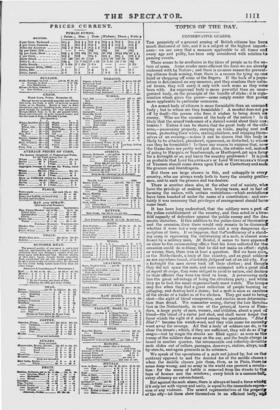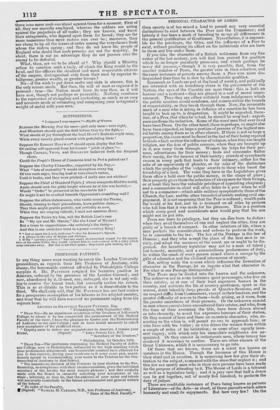TOMS 'Or THE DAY.
CONSERVATIVE GUARDS.
THE propriety of a general arming of British citizens has beds much discussed of late, and it is a subject of the highest import- ance: we are sorry that a measure applicable to all times and every age and polity, has been only considered with relation fa passing events.
There seems to be confusion in the ideas of people as to the na- ture of arms. Arms render more efficient the force we are already endowed with by Nature; and there is no more reason for prevent- ing citizens from arming, than there is a reason for tying up one hand or chopping off some of the fingers. If the bulk of a pope• lotion is determined on any measure, and they combine their nattt.. ral forces, they will carry it only with such arms as they were born with. An organized body is more powerful than an unor- ganized body, on the principle of the bundle of sticks : it is orga- nization which gives the power-arms simply render that powec more applicable to particular occasions. An armed body of citizens is more formidable than an unarmed body ; but to whom are they formidable ? A musket does not go% off by itself-the person who fires it wishes to bring down an enemy. Who are the enemies of the body of the nation ? Is it likely that the armed tradesmen of a district would shoot their cuss-i tomers ? Unless it can be shown that the great body of the citi- zens,-possessing property, carrying on trade, paying rent an taxes, protecting their wives, rearing children, and enjoying them- selves of an evening,-unless it can be shown that this body is likely to be attacked, plundered, oppressed, or disturbed, to whom can they be formidable ? Is there any reason to suppose that, -now the Game-laws are pretty well put down, the citizens will, instead of going to Margate, or Scarborough, or Hartlepool, get up a foray for a fortnight or so, and harry the country aentlemen ? It is just as probable that Lord GRANTHAM'S or Lord''WINCHILSEICS troop of Yeomen should come down upon York or Canterbury and tact the grocers and linendrapers.
But there are large classes in this, and unhappily in every country, who are always ready both to harry the country gentle-: men, and to sack the grocers and tea-dealers.
There is another class also, at the other end of society, what have the privilege of making laws, levying taxes, and in fact of farming the nation, with certain restrictions-which restrictions have been boasted of under the name of a constitution : and .cer- tainly it was necessary that privileges of management should have- some limit.
It has been long understood, that the soldiery were a part of- the police establishment of the country, and thus acted in a two.: fold capacity of defenders against the public enemy and the do... mestic disturber. If this addition to the police-force of the country met the occasion, then there would only remain to be discussed whether it were not a very expensive and a very dangerous de- scription of force. It so happens, that the'inefficiency of a stand- ing army in repressing the outbreaking of a mob, is almost con- fessed by a military man. At Bristol, it seems to have appeared so clear to the commanding officer that his force collected for the occasion could do 1u:thine-, that he did not make an effort: right or wrong, then, there was at least a question. But we have seen, in the Netherlands, a body of fine infantry, and as good soldiers as are anywhere found, absolutely fatigued out of an old city. Fot a fortnight the men never took off their clothes; and thought they did not spare the mob, and were animated with a great deal of esprit de corps, they were obliged to yield to nature, and declare to their officers they were too tired to form. A persevering mot) has the great advantage of being the attacking party ; and while they go to bed, the small organized body must watch. The troops may fire when they find a great collection of people burning or pillaging, and destroy half a dozen; but a mob is soon as careless of the stroke of a bullet as of the cholera. They get used to being shot-the sight of blood exasperates, and excites more determina- tion than dread. We remember seeing, during the late Revoltz• Lion in the Netherlands, in one of the principal towns of Flan- ders, a large party of men, women, and children, about a pool of blood-the-blood of a rioter just shot, and shall never forget the furor which the sight of it moved among the spectators. "BM Blut I " became the watch-word, and they who came for curiosity- went away for revenge. All that a body of soldiers can do, is ha clear the streets ; which, if they are sufficient, they will do as if by magic-but by magic the streets are filled again: as soon as the tramp of the soldiers dies away on the ear, and the bugle-charge is heard in another quarter, the innumerable and infinitely-divisible mob slides out of cellars, passages, doorways, stables, alleys,'andt by-streets, and again proceeds in its schemes.
We speak of the operations of a mob not joined by, but on thei contrary opposed to and the decided foe of the middle classes when the middle classes join them, then, as in Paris, there is some deep wrong, and no army in the world can prevent a revolu- tion : for the scene of battle is removed from the streets to the tops of houses and the windows ; every brick is a cannon-half, every chimney an entrenchment. But against the mob alone, there is always at hand a force whiefg if it only act with vigour and unity, is equal to the immediate repres- sion of any violence. The armed representatives of the property of the city-let them show themselves in an efficient body, aggi
there is no mere mob can stand against them for a moment. First of all, they are sacredly employed, whereas the soldiers are acting against the prejudices of all ranks ; they are known, and know their antagonists, who depend upon them for bread; they are far more numerous than mere rioters can ever be ; moreover, they are clung to by all the lovers of order among the very classes from whom the rioters spring ; and they do not know the people of England who doubt that such persons are not the majority. In short, there is not an advantage they do not possess over the . enemy to be defeated.
What, then, are we to be afraid of ? Why should a Ministry refuse to sanction such a body, of which the King would be the head, and the officers the steadiest and most respectable citizens of the empire, distinguished only from their men by superior in- telligence, greater wealth, or greater leisure ? No—if the wish to put down mobs and riots is sincere, this is the only secure mode. But then, the will of men so organized is puissant : true—the Nation must have its way then, as it will have now, though not perhaps so peaceably. Nothing conduces to the repression of struggling and contesting, so surely as an easy and accurate mode of estimating and comparing your antagonist's weight of metal with your own.



























 Previous page
Previous page